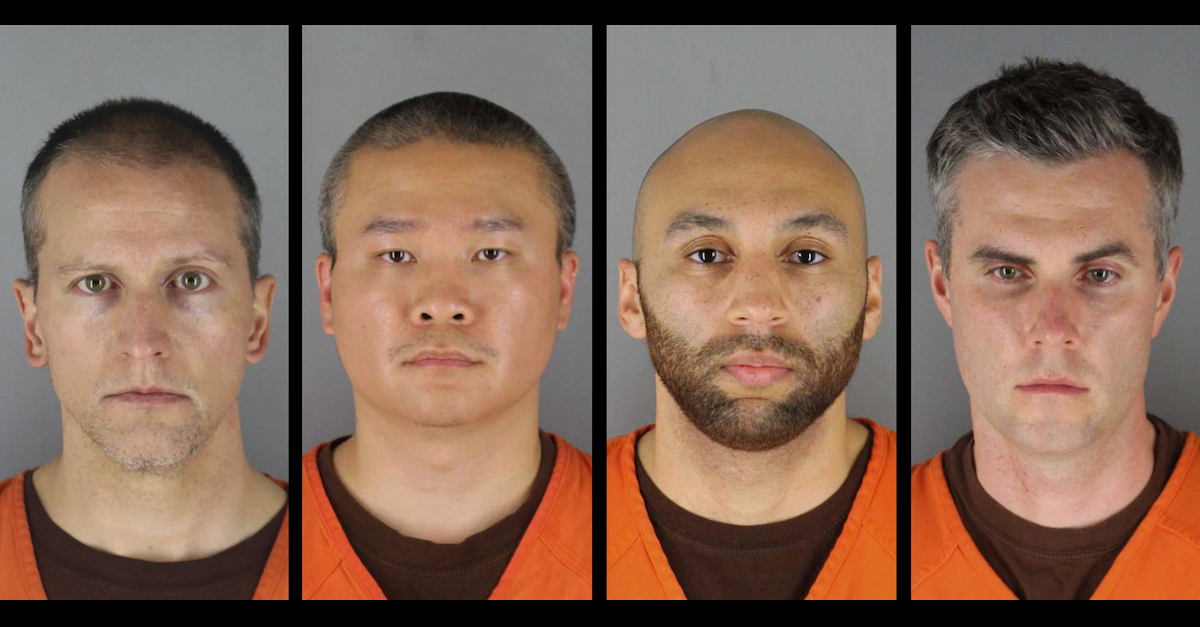
Derek Chauvin, Tou Thao, J Alexander Kueng, and Thomas Kiernan Lane
Prosecutors in Minnesota are seeking to try all four of the former Minneapolis police officers charged in the May 25 alleged murder of George Floyd in a single criminal trial.
Assistant Attorney General Matthew Frank on Wednesday filed a Motion for Joinder with the Hennepin County Court, contending that the shared circumstances of defendants Derek Chauvin, Tou Thao, J. Alexander Kueng, and Thomas Kiernan Lane favor joinder. Chauvin is charged with second-degree murder, third-degree murder and second-degree manslaughter. Kueng, Lane, and Thao, meanwhile, are charged with aiding and abetting second-degree murder and second-degree manslaughter.
In a memorandum in support of the joinder motion, prosecutors outlined four factors they say weigh in favor of a single criminal trial.
- The charges and state’s evidence against all of the defendants is similar.
“The substantive charges against Kueng, Lane, and Thao are therefore equivalent to Chauvin’s second-degree murder and second-degree manslaughter charges,” prosecutors wrote. “In other words, all four Defendants are charged with variants of the same offenses, and all of the charges against the Defendants stem from the same incident. That strongly favors joinder.”
- The impact multiple trials would have on Floyd’s family and witnesses of his killing.
Prosecutors argued that joinder is necessary to prevent those close to Floyd from being forced to relive the trauma of his death across multiple legal proceedings.
“That trauma is an especially significant factor if any family members are called to testify at trial. “Floyd’s family members would also need to travel long distances for each trial, imposing substantial financial and logistical burdens on them and making it harder for them to be present to witness justice for their deceased family member,” the memo stated.
- Joinder will not prejudice the defendants because there defenses are not antagonistic.
According to prosecutors, because the defendants are not seeking to place blame on each other (which would force the jury to choose between multiple theories), the defendants won’t be adversely affected by a single trial. The burden of establishing an antagonistic defense rests with the defendants, which prosecutors claim they cannot show.
“Even if the Defendants choose to testify, this case would not turn on whether the jury believes one Defendant’s version of the events or another’s,” prosecutors wrote. “The events leading to Floyd’s death are well-documented in police body camera videos, bystander videos, and local surveillance videos. And no Defendant has signaled that he intends to present a version of the facts that does not align with the evidence that is already known and publicly available, or that does not align with the version the other Defendants will offer.”
- The “interest of justice” favors joinder.
Prosecutors argued that conducting four separate trials would place substantial undue burden on the court system and prolong justice being served for several years.
“There is a strong thumb on the scale against conducting separate trials where, as here, the evidence presented in each of the four trials is likely to be very similar,” the memo stated. “And this factor tilts especially strongly in favor of joinder here because of the costs to the State and the court system that are likely to attend each trial, including added courthouse security, the administrative burdens in overseeing a trial that will attract global attention, the costs of separate appeals, and the potential diminution in the resources available to conduct trials for other criminal defendants in the same courthouse.”
Read the full motion below.
State s Memorandum of Law in Support of Motion for Joinder by Law&Crime on Scribd
[images via mugshots]